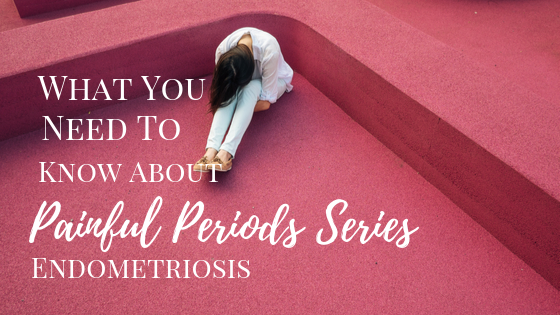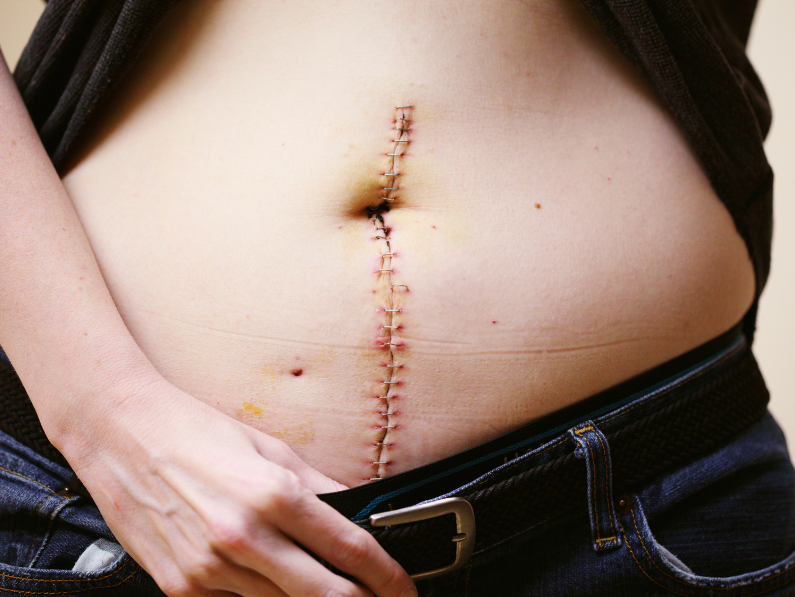Painful periods (dysmenorrhea) or experiencing mild to moderate discomfort during menstruation is considered normal. Experiencing mild to moderate cramps and discomfort during your period is quite common especially during days 1-3 of your period. I shared in my blog Why Are Period Cramps So Dang Painful? what differentiates painful, abnormal, periods from regular, normal periods. Today I want to get more specific and bring awareness to painful periods and their link to endometriosis.

Page Contents
Painful Periods & Endometriosis
If you’re not familiar with endometriosis it’s a condition in which endometrial tissue similar to that found on the uterine lining begins to develop on other organs in the pelvis outside of the uterus. Experiencing recurrent painful periods is a common sign indicating you may have an issue with endometriosis. Additionally, you may also experience other symptoms such as:
- Pelvic cramping in between periods especially during ovulation
- Painful intercourse
- Painful bowel movements or painful urination
- Spotting in between periods
- Heavy menstrual bleeding
- Infertility
Endometriosis Stages
Endometriosis is a complex disease that affects each individual differently. Additionally, there are four different stages of endometriosis that range from mild to severe.
Stage I– Less invasive endometrial implants and lesions on the ovaries and slight inflammation within the pelvic cavity. This is a mild form of endometriosis.
Stage II– When endometrial implants and lesions are present on the ovaries and on the pelvic lining. Known to be a milder form of endometriosis.
Stage III– This stage involves more invasive endometrial implants on the pelvic lining or deep implants such as endometrioid cysts on the ovaries. Considered to be a more moderate form of endometriosis.
Stage IV– This is the most severe form of endometriosis and includes deep endometrial implants on the pelvic lining, fallopian tubes, and bowels. There are usually endometrioid cysts present on the ovaries as well.
The severity of symptoms experienced has little to do with stage and more to do with the person. Some sufferers may experience little to no symptoms and have a more advanced stage of endometriosis while others may experience more symptoms and have a less severe stage of endometriosis. This is what makes it so difficult to diagnose endometriosis.

Endometriosis and Misdiagnosis
As a matter of fact, it’s quite common for endometriosis to go undiagnosed. This is due to endometriosis symptoms resembling the symptoms of other diseases such as Irritable Bowel Syndrome (IBS), pelvic inflammatory disease (PID) and other reproductive disorders. This makes it increasingly important to discuss your painful periods with your doctor, track symptoms, and understand what your risk factor is as it relates to endometriosis.
What Causes Endometriosis?
Endometriosis remains an idiopathic disease and condition in which medical professionals are unsure as to what causes this disease. But there are various theories and risk factors associated with the onset of endometriosis.
Genetics/Hereditary
A common theme among women with endometriosis is that there is a family history of this disease. In many, there’s an increased risk of endometriosis development for women that have a mother, sister or aunt with endometriosis.

Retrograde Menstruation
One such theory is the idea that retrograde menstruation leads to endometrial implants and endometrioid cysts. Retrograde menstruation is when menstrual blood and tissue flow backward into the pelvic cavity instead of flowing outwards. The blood and tissue contained in the menstrual flow adhere to the pelvic walls, fallopian tubes, ovaries, and other pelvic organs. Additionally, this tissue remains responsive to female sex hormones (estrogen and progesterone). This displaced endometrial tissue thickens and sheds with each menstrual cycle. And, since there is no way for it to exit the body it becomes trapped which leads to scarring, adhesions, and cyst formation.
Immune System Disorder
The second idea is that the body has an immune system disorder. With an immune system disorder, the body is unable to detect the difference between endometrial tissue that’s growing outside of the uterus and endometrial tissue growing on the uterine wall. Since the body isn’t able to make this distinction it doesn’t attack and destroy the endometrial tissue growing outside of the uterus which leads to endometrial implants on various organs within the pelvis.
Risk Factors to Be Aware of
Additionally, there are risk factors you should keep in mind as it relates to the possibility of you developing endometriosis. These risk factors include:
- Not having a child
- Early-onset of menses
- Late-onset of menopause
- Short menstrual cycles that last for less than 27 days
- Heavy bleeding during your period especially prolonged bleeding that lasts for 7 days or longer
- Experiencing estrogen dominance or high levels of estrogen
Complications Of Endometriosis
There are various health and fertility complications associated with endometriosis. The most common is infertility, increased risk of chronic illness/autoimmune disorders, and ovarian cancer risk.

Infertility
While not all women who have endometriosis struggle with infertility one-third to one-half of women diagnosed with endometriosis will struggle with infertility. In and of itself endometriosis doesn’t cause infertility directly but rather indirectly. One way it can complicate fertility is by preventing the fertilization process. This happens when obstructions due to endometrial implants causing scarring, adhesions, and cysts prevent the sperm from joining with the egg. Secondly, endometriosis indirectly impacts fertility due to the inflammatory environment it creates within the body. High levels of inflammatory hormones can contribute to ovulation dysfunction by way of hormonal imbalance. This leads to eggs not being released or released irregularly which impacts fertility negatively.
Chronic Illness & Autoimmune Disorder
It is thought that there is an abnormal immune system response in women who suffer from endometriosis. Researchers are not clear whether this is due to the inflammatory nature of endometriosis or if there’s another factor that contributes to this. Either way, endometriosis sufferers have an increased instance of developing other chronic conditions or autoimmune disorders. Common illnesses linked to endometriosis sufferers include:
- Fibromyalgia
- Rheumatoid Arthritis
- Hypothyroidism
- Celiac Disease
- Heart Disease
- Irritable Bowel Syndrome
- Recurrent Vaginal Infections
Depression and anxiety are other common complications for women with endometriosis. This is due to the issue of dealing with chronic pain and struggles to obtain a proper diagnosis.

When to Discuss Your Painful Periods with Your Doctor?
If you’re struggling with painful periods you’re probably wondering when is the right time to discuss what you’re experiencing with your doctor. I would say that creating open communication with your doctor from the beginning and discussing your painful periods is the best place to start. Endometriosis usually sets in a few years after the initial onset of menses so if you have a personal history of painful periods you should avoid waiting for symptoms to become progressive before you bring it up to your doctor. Additionally, you should educate yourself on your family health history. Does your sister, mother or aunt have endometriosis? In addition to painful periods are you experiencing one or more common endometriosis symptoms? Are you struggling to conceive? This should be information that you disclose and share with your doctor while disclosing your full medical and menstrual health history.
Remember Painful Periods Aren’t Normal
Having painful periods doesn’t always mean that you have endometriosis or that you’ll have endometriosis in the future. But, having recurrent painful periods that interfere with your daily life isn’t normal and requires a serious discussion with your doctor. Even if you think that you may be overreacting it’s better to play it safe and discuss your symptoms with your OB/GYN. Tracking your symptoms will provide insights for you and your doctor in regards to what’s going on with your reproductive health.
If at any time you find that your doctor doesn’t take your concerns or your symptoms seriously go get a second opinion. While there is more information regarding endometriosis there is still a negative stigma surrounding menstrual health and women’s health issues. This means you have to be your own advocate for your health and push to get a proper diagnosis when you know something isn’t right.
Struggling with Painful Periods or Endometriosis?
Learn more about how to manage painful periods and endometriosis. Check out the resources below. And, if you have questions or want to share your experience with painful periods or endometriosis leave me a comment below. I’d love to connect with you!
Why Are Period Cramps So Dang Painful?
Painful Periods & How to Manage Them
The Effects of Endometriosis on Infertility
Join My Mailing List!
Are you part of my email community? If not, you should definitely sign up! Additionally, you’ll receive all of my blogs and videos delivered straight to your inbox. And, you also get to learn more about me and my journey with endometriosis, painful periods and infertility. Other goodies you can enjoy are early bird access to my courses, special events, and workshops. So, make sure you sign up it’s completely free of charge but full of benefits!
[gravityform id=”1″ title=”true” description=”true”]
References.
Medicine Net, Medical Definition of Endometrioma: written by Melissa Conrad Stöppler MD
About the Author.
 Hi, my name is Kathleen but you can call me Kat. I’m a health and wellness professional turned freelance writer and content creator. My personal struggle with infertility, endometriosis and ovarian cysts made me realize that there just isn’t enough information out there available to women to help them learn more about PCOS, endometriosis, adenomyosis, or fibroids. Basically, there’s a serious lack of information concerning a variety of women’s health topics and issues and well I got fed up. I decided to be the change and created this blog in an effort to spread awareness and advocate for women’s health issues. It has now become my passion to educate and empower women to redefine their health and be their own advocate. You can find me on YouTube and Instagram. If you take the opportunity to visit me on my other platforms don’t hesitate to leave a message, I would love to hear from you!
Hi, my name is Kathleen but you can call me Kat. I’m a health and wellness professional turned freelance writer and content creator. My personal struggle with infertility, endometriosis and ovarian cysts made me realize that there just isn’t enough information out there available to women to help them learn more about PCOS, endometriosis, adenomyosis, or fibroids. Basically, there’s a serious lack of information concerning a variety of women’s health topics and issues and well I got fed up. I decided to be the change and created this blog in an effort to spread awareness and advocate for women’s health issues. It has now become my passion to educate and empower women to redefine their health and be their own advocate. You can find me on YouTube and Instagram. If you take the opportunity to visit me on my other platforms don’t hesitate to leave a message, I would love to hear from you!






